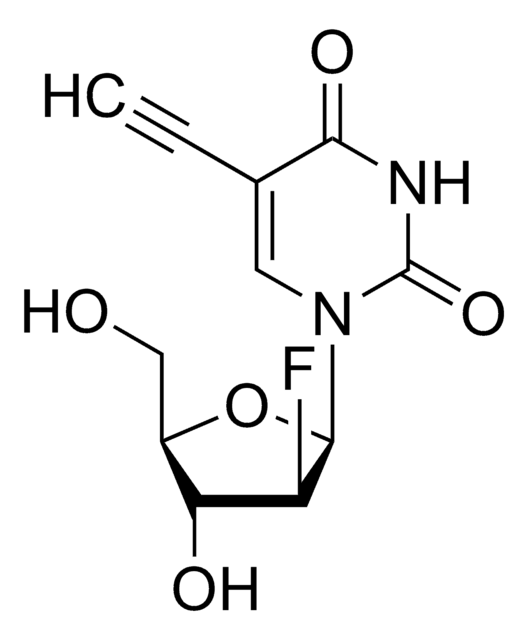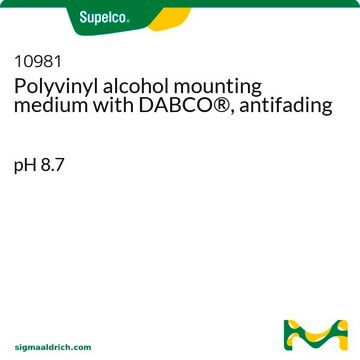T511307
5-Ethynyl-2′-deoxycytidine, (EdC)
AldrichCPR
Sinónimos:
2′-Deoxy-5-ethynylcytidine
About This Item
Productos recomendados
Quality Level
reaction suitability
reaction type: click chemistry
SMILES string
NC1=NC(=O)N(C=C1C#C)[C@H]2C[C@H](O)[C@@H](CO)O2
InChI
1S/C11H13N3O4/c1-2-6-4-14(11(17)13-10(6)12)9-3-7(16)8(5-15)18-9/h1,4,7-9,15-16H,3,5H2,(H2,12,13,17)/t7-,8+,9+/m0/s1
InChI key
HMJSYXIPNSASJY-DJLDLDEBSA-N
Application
Other Notes
NOTWITHSTANDING ANY CONTRARY PROVISION CONTAINED IN SIGMA-ALDRICH′S STANDARD TERMS AND CONDITIONS OF SALE OR AN AGREEMENT BETWEEN SIGMA-ALDRICH AND BUYER, SIGMA-ALDRICH SELLS THIS PRODUCT "AS-IS" AND MAKES NO REPRESENTATION OR WARRANTY WHATSOEVER WITH RESPECT TO THIS PRODUCT, INCLUDING ANY (A) WARRANTY OF MERCHANTABILITY; (B) WARRANTY OF FITNESS FOR A PARTICULAR PURPOSE; OR (C) WARRANTY AGAINST INFRINGEMENT OF INTELLECTUAL PROPERTY RIGHTS OF A THIRD PARTY; WHETHER ARISING BY LAW, COURSE OF DEALING, COURSE OF PERFORMANCE, USAGE OF TRADE OR OTHERWISE.
Storage Class
11 - Combustible Solids
wgk_germany
WGK 3
flash_point_f
Not applicable
flash_point_c
Not applicable
Elija entre una de las versiones más recientes:
Certificados de análisis (COA)
Lo sentimos, en este momento no disponemos de COAs para este producto en línea.
Si necesita más asistencia, póngase en contacto con Atención al cliente
¿Ya tiene este producto?
Encuentre la documentación para los productos que ha comprado recientemente en la Biblioteca de documentos.
Los clientes también vieron
Contenido relacionado
Metabolic incorporation of bioorthogonal groups into cellular DNA enhances research with synthetic nucleoside addition.
Metabolic incorporation of bioorthogonal groups into cellular DNA enhances research with synthetic nucleoside addition.
Metabolic incorporation of bioorthogonal groups into cellular DNA enhances research with synthetic nucleoside addition.
Metabolic incorporation of bioorthogonal groups into cellular DNA enhances research with synthetic nucleoside addition.
Nuestro equipo de científicos tiene experiencia en todas las áreas de investigación: Ciencias de la vida, Ciencia de los materiales, Síntesis química, Cromatografía, Analítica y muchas otras.
Póngase en contacto con el Servicio técnico











